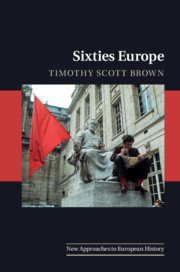2 - Cold War(s) and Hot
Published online by Cambridge University Press: 16 July 2020
Summary
“Cold Wars and Hot” situates the 1960s in Europe in the twin contexts of Third World decolonization struggles and the global Cold War, tracing its roots in the anti-fascist struggles of the postwar period and the anti-Stalinist rebellions of the 1950s. The latter, in Hungary and Poland especially, sought not a return to capitalism but a path forward to socialist workers’ democracy that, even if stillborn in the East, placed key items on the agenda for the European 1960s. Even in the face of the post-1945 persistence of fascist structures and ideas, meanwhile, key moments in European revolutionary history—above all the Spanish Civil War of the 1930s—continued to reverberate in the radical imagination of the 1960s. The chapter concludes with an examination of the emergence of an anti-Stalinist New Left, in Great Britain and elsewhere, which in the late 1950s and early 1960s laid the indispensable foundation for the student and countercultural rebellions of later in the decade.
Keywords
- Type
- Chapter
- Information
- Sixties Europe , pp. 33 - 66Publisher: Cambridge University PressPrint publication year: 2020

